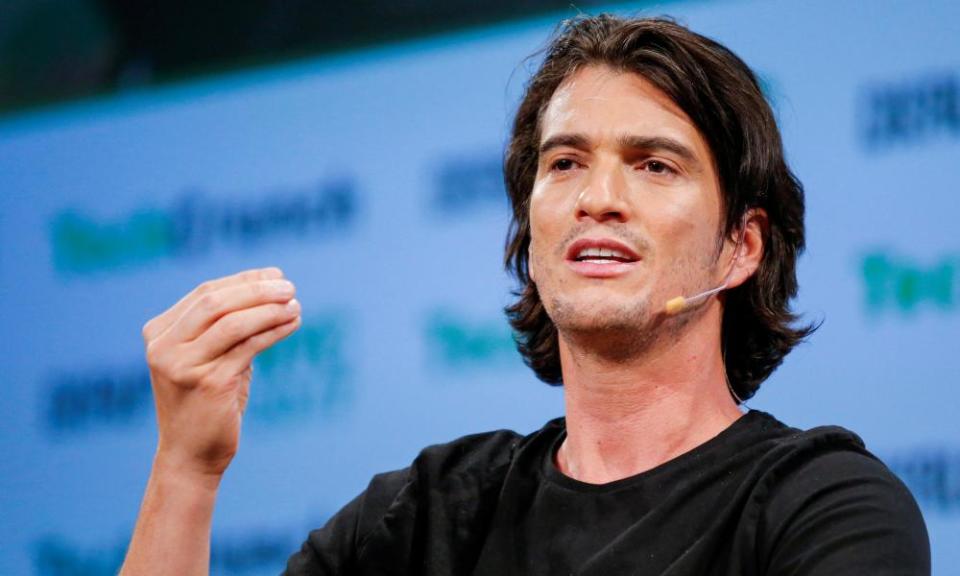Adam Neumann under pressure to step down as WeWork chief

The board of WeWork was expected to meet on Monday to discuss the future of the company’s co-founder and chief executive, Adam Neumann, after it emerged he is under pressure to step down from the top job.
Several board members, including representatives of the firm’s biggest investor, Japan’s SoftBank, are understood to be pressing Neumann to demote himself from chief executive to vice-chairman. The company was embarrassingly forced to pull its much-anticipated stock market flotation after failing to impress Wall Street investors.
Neumann’s erratic behaviour, including the revelation last week that he smoked marijuana on a private jet and promoted tequila-fuelled company parties, is thought to have angered SoftBank’s founder Masayoshi Son. SoftBank has pumped almost $11bn (£8.8bn) into the We Company, the parent company of WeWork, and holds about 30% of the shares.
Ron Fisher, SoftBank’s vice-chairman, sits on the WeWork board, alongside Mark Schwartz, a former SoftBank board member. It is unclear how many of the seven board members support the effort to force Neumann to step down as chief executive. SoftBank and WeWork declined to comment.
Even if a majority of WeWork board members support the ousting of Neumann, he could still overrule them because his shares have 10 times the voting rights of other shareholders and he has the power to replace board members. Sources suggested to Reuters that SoftBank was proposing to ask Neumann to become interim chief executive while a headhunting firm was hired to find an external replacement. The Wall Street Journal first reported on Sunday that SoftBank was trying to oust Neumann as chief executive.
Neumann, 40, who founded the shared office provider with his friend Miguel McKelvey in 2010, last week admitted to staff that he had been “humbled” by Wall Street’s lukewarm reaction to his plans for an initial public offering (IPO).
The company’s expected IPO valuation had already more than halved from the $47bn placed on it when SoftBank pumped in money in the latest funding round in January. The IPO was officially postponed on 16 September, after some bankers suggested it might attract a valuation as low as $15bn.
Neumann had been heavily criticised by investors and corporate governance experts for seeking to force through very unusual arrangements that would have given him disproportionate control of the firm.
In its initial IPO documents Neumann had wanted his shares to carry 20 times the votes of ordinary shares, and for his wife to have a say in selecting his successor should he die. The documents also initially showed that WeWork’s board would include no women. Anger from potential investors caused WeWork to change all of these policies, cutting his voting rights to 10 times those of other investors, removing his wife’s role from succession planning, and adding Frances Frei, an academic at Harvard Business School, to its board.
Neumann also repaid $5.9m that the company had paid him in exchange for his trademark of the word “We”.
In a sign of the deteriorating relations between SoftBank and WeWork, Neumann did not participate in a gathering of executives of companies backed by SoftBank in Pasadena, California, last week.
Neumann is known for imposing odd directives affecting all WeWork employees. In 2018, he banned employees from eating meat on WeWork property in an attempt to improve sustainability and address the climate crisis. WeWork later changed the policy to state that employees could not expense meals containing meat but they could eat it in company offices. Some employees are said to have seen Neumann eating meat at the office after announcing the ban.
If Neumann is ousted it would be similar to the fate that befell Uber’s co-founder Travis Kalanick who resigned as chief executive of the ride-sharing startup in June 2017 . It followed a rebellion among Uber’s board over a string of scandals, including allegations of enabling a toxic work culture of sexual harassment and discrimination.
Uber replaced Kalanick, who began Uber in 2009, with former Expedia chief executive Dara Khosrowshahi. With Kalanick out of the picture, Uber was able to successfully float its shares on the New York stock exchange in May 2019.

 Yahoo Finance
Yahoo Finance 